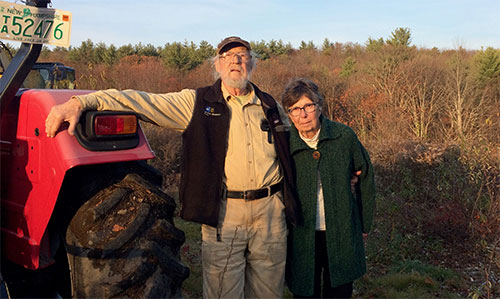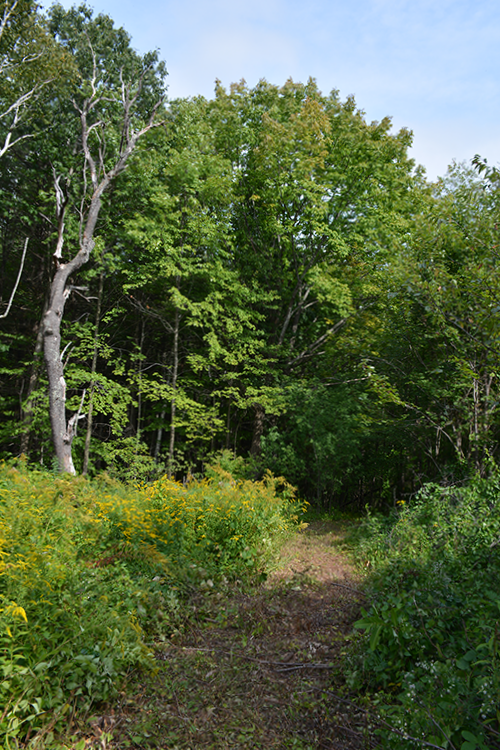The Koerber Family Forest: Window to the Past, Doorway to the Future
Interview and article by David Tirrell-Wysocki
Ken Koerber pauses frequently as he walks through the forest behind the family farm he and his wife, Susan, have nurtured for more than a half century near the center of Dunbarton.
He gazes at towering oak trees, marvels at huge boulders and small rocks left behind by the glaciers and listens to birds and running streams. He also ponders the toil of farmers who once cleared the forest and built stone walls that mark the fields and pastures of long ago.
Ken and Susan see the forest as a tribute to past generations who walked its trails, used its resources and preserved it to provide sustenance and solitude for their family. Now, they have ensured that future generations will have the same opportunity.
The Koerbers have conserved the forest through Five Rivers Conservation Trust — protecting three headwater streams, wildlife habitat and trails; adding to a block of approximately 650 acres of nearby conserved land; and continuing to provide an outdoor classroom for the neighboring Dunbarton Elementary School.
Though Ken and Susan became “owners” of the 113-acre forest and a 1786 farmhouse and fields in 1969, they are mindful that they have been walking in someone else’s footsteps.
“The land just is,” said Susan. “It’s here, and somehow we are allowed to be here.”
Ken and Susan raised three children on their farm, growing their own food and learning from the land.
Susan enjoys growing healthy, organic food right outside her door.
“Every night in the summer, I walk around the garden with a basket and say, ‘Hmmm what shall we eat today?’”
Ken’s view of the land underwent a long evolution from initially envisioning houses along a ridge with scenic views to now imagining how nice it would be to erect a small observation tower on the same ridge, offering the views to all.
“Over the years I started realizing building houses might be a good economic picture, but it wasn’t a good ecological one and it wasn’t a good social one,” he said.
Ken is a retired electrical and systems engineer. Susan is a retired educator who founded Concord’s Woodside School in 1978. At their home, they now own and operate Chanticleer Gardens, dedicated to producing organically-grown cut flowers for local florists and retailers. In addition to enjoying the forest, Ken and Susan hope future generations will use the farmland portion of their property to continue producing food and help others learn about farming.
Learning from the forest also is important to the Koebers. They envision generations of future school children exploring geology, history, nature and, well, just exploring.
Walking through the woods, Ken points out features at every turn and asks questions as if he is a school kid, or their teacher. “Why are these stone walls in the middle of the woods?”
“Why are all of these holes here,” he asks while passing a decaying tree that had been a target for woodpeckers or other creatures.
“Look at that,” he said, pointing to a new tree sprouting from the fallen trunk of another. “The will to live. A tree gets knocked over, but it’s not dead.”
Susan’s favorite spot in the woods is a quiet hemlock grove.
“It is very soft and very peaceful,” she said. “The tree itself is very feathery.”
Ken stops at his special spot — where a rushing stream crosses a wide path that doubles at a cross-country trail in the winter.
“The picture doesn’t change except that the water is continually moving,” he said. “I could spend a half hour here just watching and listening and thinking and meditating.
“I love it, other people will love it –that’s really my motivation for wanting to share this,” he said.
—
Conservation of the Koerber Family Forest culminated a multi-year effort by Five Rivers to raise the funds to purchase the conservation easement, after the Koerbers’ initial offer to donate half of the value of the easement.
Partners included New Hampshire’s Land & Community Heritage Investment Program (LCHIP), the Dunbarton Conservation Commission, the Merrimack Conservation Partnership, the New Hampshire’s “Moose Plate” Conservation Grant Program, the New Hampshire Drinking Water and Groundwater Trust Fund Grant and private donors.





